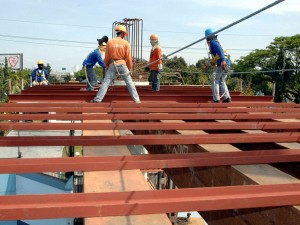Raising government revenues further to finance the state’s ambitious infrastructure program will be key to keeping economic growth above the 7-percent threshold for increasing jobs and reducing poverty, the World Bank said.
In its East Asia and Pacific Economic Update report released Monday, the multilateral lender said lawmakers should seriously consider raising existing taxes—similar to what was done for excise taxes in 2012—as a quick way of growing state coffers.
The government was also told to sustain reforms in tax administration to improve collections and broaden the state’s revenue base.
“Clearly, there is tremendous need in the Philippines [for resources] in several areas … most prominently for infrastructure, and that’s going to cost money,” World Bank East Asia and Pacific Chief Economist Bert Hoffman said at a press briefing. “To remain sustainable at a fiscal deficit level, revenues have to be raised further and it can’t be done just with administrative measures. It doesn’t have to be new taxes, but simply updates to existing taxes.”
In its report, the World Bank said the Philippine economy’s growth was expected to slow down by six-tenths of a percentage point to 6.6 percent this year as damage to key provinces caused by Supertyphoon “Yolanda” late last year adversely affect business activity and consumer demand.
This would be slower than last year’s 7.2 percent. The bank’s projection was the same as its previous forecast, which was published last month. The updated forecast was still within the government’s growth target of 6.5 to 7.5 percent for this year.
Additional spending on infrastructure, made possible through higher revenues, would be crucial for the country to meet the government’s target of growth of up to 8.5 percent in 2016, the World Bank said.
The Aquino administration wants to raise infrastructure spending to the equivalent of 5 percent of gross domestic product (GDP) by 2016, up from just 2.5 percent last year.
World Bank senior economist for the Philippines Karl Kendrick Chua said that apart from raising the rate for existing taxes, improving collections through stricter enforcement held more promise for increasing revenues.
He cited the example of the expanded value-added tax (E-VAT), which was raised to 12 percent from 10 percent in 2006. Prior to the increase, collection efficiency averaged 30 percent. After raising the rate, efficiency increased to 35 percent, but in the five years that followed, was eroded back to 30 percent. “What this tells us is that the problem is the administration,” Chua said.
Chua noted that in 1997, tax collections in the country were equivalent to 18 percent of GDP. This fell to 12 percent in 2010. He said the Aquino administration has been successful in slowly raising taxes relative to GDP. In 2012 alone, tax collections rose by 0.6 percent of GDP.
